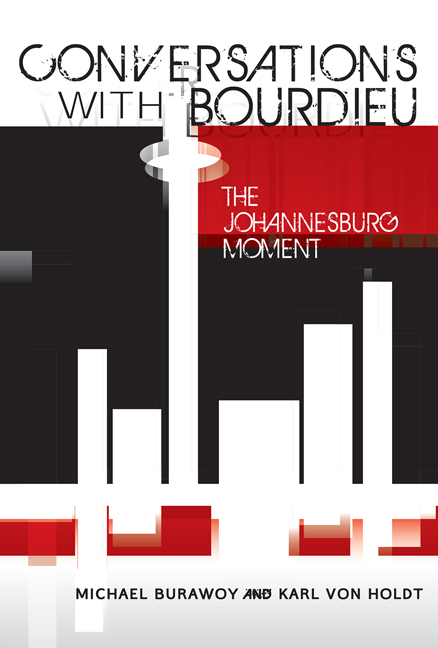Book contents
- Frontmatter
- Contents
- Abbreviations and acronyms
- Preface
- Prologue The Johannesburg Moment
- Acknowledgements
- CONVERSATION 1 SOCIOLOGY AS A COMBAT SPORT
- CONVERSATION 2 Theory and Practice
- Marx Meets Bourdieu
- Bodies of Defiance
- CONVERSATION 3 CULTURAL DOMINATION
- CONVERSATION 4 COLONIALISM AND REVOLUTION
- CONVERSATION 5 PEDAGOGY OF THE OPPRESSED
- CONVERSATION 6 THE ANTINOMIES OF FEMINISM
- CONVERSATION 7 INTELLECTUALS AND THEIR PUBLICS
- CONVERSATION 8 MANUFACTURING DISSENT
- Epilogue Travelling Theory
- Bibliography
- Index
Marx Meets Bourdieu
from CONVERSATION 2 - Theory and Practice
Published online by Cambridge University Press: 20 April 2018
- Frontmatter
- Contents
- Abbreviations and acronyms
- Preface
- Prologue The Johannesburg Moment
- Acknowledgements
- CONVERSATION 1 SOCIOLOGY AS A COMBAT SPORT
- CONVERSATION 2 Theory and Practice
- Marx Meets Bourdieu
- Bodies of Defiance
- CONVERSATION 3 CULTURAL DOMINATION
- CONVERSATION 4 COLONIALISM AND REVOLUTION
- CONVERSATION 5 PEDAGOGY OF THE OPPRESSED
- CONVERSATION 6 THE ANTINOMIES OF FEMINISM
- CONVERSATION 7 INTELLECTUALS AND THEIR PUBLICS
- CONVERSATION 8 MANUFACTURING DISSENT
- Epilogue Travelling Theory
- Bibliography
- Index
Summary
The historical success of Marxist theory, the first social theory to claim scientific status that has so completely realized its potential in the social world, thus contributes to ensuring that the theory of the social world which is the least capable of integrating the theory effect – that it, more than any other, has created – is doubtless, today, the most powerful obstacle to the progress of the adequate theory of the social world to which it has, in times gone by, more than any other contributed.
Bourdieu (1991 [1984]: 251)What is Bourdieu saying here? The historical success of Marxism is to have constituted the idea of class out of a bundle of attributes shared by an arbitrary assemblage of people, what he calls ‘class on paper’. Aided by parties, trade unions, the media and propaganda – an ‘immense historical labor of theoretical and practical invention, starting with Marx himself’ (Bourdieu, 1991 [1984]: 251) – Marxism effectively called forth the working class as a real actor in history, an actor that otherwise would have had only potential existence. However, Marxism did not see itself as constituting the working class, but as discovering and then reflecting the prior existence of an objective class that was destined to make history in its own image. Marxism did not have the tools to understand its own effect – ‘theory effect’ – without which there would be no ‘working class’. In short, Marxism did not comprehend its own power – the power of its symbols – and thus missed out on the importance of symbolic domination.
But why does Marxism constitute such a ‘powerful obstacle to the progress of the adequate theory of the social world’ (Bourdieu, 1991 [1984]: 251) now, if before it had been so successful? Here I conjecture the answer to be as follows. In failing to recognise the symbolic world, Marxism fails to anticipate the emergence of fields of symbolic production – fields of art, literature, science, journalism – that engender their own domination effects, overriding and countering Marxism's symbolic power. Marxism cannot understand that a classification or representational struggle has to precede class struggle, i.e. classes have to be constituted symbolically before they can engage in struggle.
- Type
- Chapter
- Information
- Conversations with BourdieuThe Johannesburg Moment, pp. 31 - 46Publisher: Wits University PressPrint publication year: 2012

